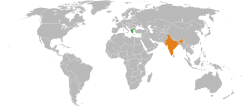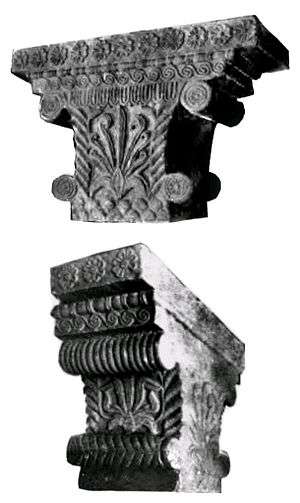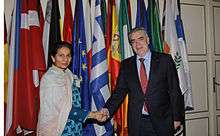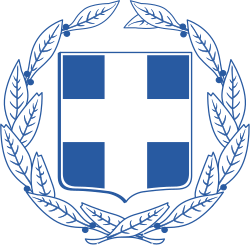Greece–India relations
 | |
Greece |
India |
|---|---|
Greece-Indian relations are the relations between Greece and India. Greece has an embassy in New Delhi and three honorary consulates in Kolkata, Chennai and Mumbai. India has an embassy in Athens and a honorary consulate in Thessaloniki.
Historical relations
Ancient Time

For the Greeks "India" meant only the upper Indus till the time of Alexander the Great. After "India" meant to the Greeks most of the northern half of the Indian subcontinent. The Greeks referred to the Indians (people of present-day India and Pakistan) as "Indói" (Ἰνδοί), literally meaning "the people of the Indus River".
Ctesias in his work Indika (Greek: Ινδικά), records the beliefs and view of the Persians about India.
The Greek explorer Scylax, in about 515 BCE, was sent by King Darius I of Persia to follow the course of the Indus River and discover where it led.
Alexander the Great and his army fought the Indian army of King Porus at the Indian campaign of Alexander the Great.
Part of today's India became the Indo-Greek kingdoms founded by the successor of Alexander the Great. (Greek conquests in India)
According to Indian sources, Greek troops seem to have assisted Chandragupta Maurya in toppling the Nanda Dynasty and founding the Mauryan Empire.[1]
Later, Seleucus I army encountered Chandragupta army. Chandragupta and Seleucus finally concluded an alliance. Seleucus gave him his daughter in marriage, ceded the territories of Arachosia, Herat, Kabul and Makran and he received 500 war elephants.
The Greek ethnographer and explorer of the Hellenistic period, Megasthenes was the ambassador of Seleucus I at India. In his work, Indika (Greek: Ινδικά), he wrote the history of Indians and their culture. Megasthenes also mentions about the prehistoric arrival of God Dionysus and Herakles (Megasthenes' Herakles) in India.
In addition, the epic poem Dionysiaca, mention about the God Dionysus expedition to India.
Arrian, in his work Indica (Greek: Ἰνδική) has written about India.
Dionysius was a Greek ambassador at India, sent by Ptolemy Philadelphus.
The Heliodorus pillar is a stone column that was erected around 110 BCE in present-day central India in Vidisha near modern Besnagar, by Heliodorus (Greek: Ἡλιόδωρος), a Greek ambassador of the Indo-Greek king Antialcidas to the court of the Shunga king Bhagabhadra. The site is located only 5 miles from the Buddhist stupa of Sanchi.
The Greek historian Apollodorus and the Roman historian Justin, affirm that the Bactrian Greeks conquered India. Justin, also describe Demetrius I as "King of the Indians". Greek and Indian sources indicate that the Greeks campaigned as far as Pataliputra until they were forced to retreat following a coup in Bactria in 170 BC.
The Greek sophist Philostratus, in his work Life of Apollonius of Tyana (Greek: Βίος Απολλωνίου του Τυανέως), mention that the Greek philosopher Apollonius have travelled to India.
The King Phraotes received a Greek education at the court of his father and spoke Greek fluently.[2]
Diodorus, quoting Iambulus mention that the king of Pataliputra had a "great love for the Greeks".[3][4]
Eusebius mentions that according to Aristoxenus, Indias went to Athens and conversed with Socrates.[5]
Buddhism flourished under the Indo-Greeks, leading to the Greco-Buddhist cultural syncretism. The arts of the Indian sub-continent were also quite affected by Hellenistic art during and after these interactions. (Hellenistic influence on Indian art)
Zarmanochegas, met Nicholas of Damascus in Antioch and later he also traveled to Athens where he burnt himself to death.[6][7]
Varāhamihira, in a passage where he calls on the people to honour the Brahmans, said: “the Greeks, though impure, must be honoured, since they are trained in sciences, and therein excelled others. What, then are we to say of a Brahman, if he combines with his purity the height of science?”[8]
18th–19th century
There is now tangible evidence indicating that the settlement of Greek merchants in Bengal must have begun as early as the beginning of the seventeenth century.[9] Dimitrios Galanos (Greek: Δημήτριος Γαλανός, 1760–1833) was the earliest recorded Greek Indologist. His translations of Sanskrit texts into Greek made knowledge of the philosophical and religious ideas of India available to many Europeans. A "Dimitrios Galanos" Chair for Hellenic Studies was established at Jawaharlal Nehru University in New Delhi, India in September 2000.
Modern Time
Relations between Greece and India started in May 1950. India opened its resident Embassy in Athens in March 1978. The new Greek Embassy building in New Delhi was inaugurated on 6 February 2006.
Three Indian companies were having partners in Greece and 15 Greek companies are operating in India.
The graves of Indians who died in Greece during the two World Wars are located in the memorial grounds of the cemeteries of the Allied Forces in Athens and Thessaloniki.
Thessaloniki was twinned with Kolkata at January 2005.
About 12,000–13,000 Indian people live in Greece.
India and Greece enjoy close bilateral relations and annual bilateral trade stands at of $0.50 billion. Greece backs India for UNSC permanent membership.
List of recent bilateral visites
- In December 2000, Greek Foreign Minister George Papandreou visited India.
- In February 2001, Prime Minister of Greece Kostas Simitis visited India.
- In September 2006, Speaker of the Lok Sabha Somnath Chatterjee visited Greece.
- In April 2007, President of India Avul Pakir Jainulabdeen Abdul Kalam made an unofficial visit to Athens.
- In June 2018, President of India Ram Nath Kovind made an official visit to Athens.
List of bilateral treaties

- Agreement on Cultural Exchange, 1961
- Agreement on Avoidance of Double Taxation, 1967
- Agreement for Joint Commission for Economic, Scientific and Technical Cooperation, 1983.
- Joint Business Council of FICCI and ASSOCHAM and the Athens Chamber of Commerce, 1996.
- Agreement of Co-operation between Hellenic Foreign Trade Board and India *Trade Promotion Organisation, 1996.
- Agreement on Tourism Cooperation, 1998.
- MoU on Defence Cooperation, 1998.
- MoU for Cooperation in Agriculture, 2001.
- Agreement on Promotion and Reciprocal Protection of Investments (BIPA), 2007.
- Agreement on Co-operation in Science & Technology, 2007.
- MOU between CII and Federation of Greek Industries, 2007.
- MOU for Co-operation between Institute of Science, Bengaluru and *National Technical University of Athens (NTUA), 2007
See also
References
- ↑ Kumar, Praveen (November 2017). Complete Indian History for IAS Exam: Highly Recommended for IAS, PCS and other Competitive Exam. Educreation Publishin. p. 81.
- ↑ (Life of Apollonius Tyana, II 31)
- ↑ The historian Diodorus wrote that the king of Pataliputra, apparently a Mauryan king, "loved the Greeks": "Iambulus, having found his way to a certain village, was then brought by the natives into the presence of the king of Palibothra, a city which was distant a journey of many days from the sea. And since the king loved the Greeks ("Philhellenos") and devoted to learning he considered Iambulus worthy of cordial welcome; and at length, upon receiving a permission of safe-conduct, he passed over first of all into Persia and later arrived safe in Greece" Diodorus ii,60.
- ↑ "Diodorus testifies to the great love of the king of Palibothra, apparently a Mauryan king, for the Greeks" Narain, "The Indo-Greeks", p. 362.
- ↑ The Book of Eusebius #4, p.343
- ↑ Strabo, xv, 1, on the immolation of the Sramana in Athens (Paragraph 73).
- ↑ Dio Cassius, liv, 9.
- ↑ Mishra, Mohan (March 2012). India Through Alien Eyes. BalboaPressAU. p. 54. ISBN 978-1452504513.
- ↑ Three Centuries of Hellenic Presence in Bengal
Further reading
- "India in Greece" by E.Pococke (1852)
- "The Greeks in India" by Demetrios Th. Vassiliades (2000)
- "The shape of Ancient Thought: Comparative Studies in Greek and Indian Philosophies" by Thomas McEvilley
- "Greeks and Buddhism" by Demetrios Th. Vassiliades (2016)
- Kazanas, Nicholas. "Archaic Greece and the Veda." Annals of the Bhandarkar Oriental Research Institute 82.1/4 (2001): 1–42.
- Kazanas, N. "Advaita and Gnosticism." Indian Historical Review 32.1 (2005): 197–254.
- Kazanas, Nicholas. "Renaissances with Vedic Vaāk and Hellenic Logos." IUP Journal of History & Culture 4.4 (2010).
- Kazanas, N. 2004 ‘Plato and the Upaniṣads’ in Brahmavidyā: Adyar Library Bulletin.
- Swarup, Ram (2000). " India and Greece" In: On Hinduism: Reviews and reflections. New Delhi: Voice of India.
- Timothy Lomperis, Hindu Influence on Greek Philosophy: The Odyssey of the Soul From the Upanishads to Plato
- Meenakshi Jain, The India They Saw : Foreign accounts (co-edited with Sandhya Jain, 4 Volumes, Prabhat Prakashan), ISBN 8184301065, ISBN 8184301073, ISBN 8184301081, ISBN 818430109X.
- Majumdar, R. C. (1981). The Classical accounts of India: Being a compilation of the English translations of the accounts left by Herodotus, Megasthenes, Arrian, Strabo, Quintus, Diodorus, Siculus, Justin, Plutarch, Frontinus, Nearchus, Apollonius, Pliny, Ptolemy, Aelian, and others with maps. Calcutta: Firma KLM.

